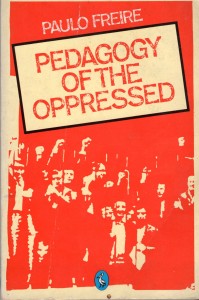Living Up to Our Expectations
 Because of Dr. Jesse Stommel and other individuals associated with Hybrid Pedagogy, I have recently re-read the second chapter of Paulo Freire’s Pedagogy of the Oppressed (1968); a book I have not opened since graduate school. Even though I still find the text extremely demanding, on the first day of class next week, I will be assigning the chapter to my introductory composition students.
Because of Dr. Jesse Stommel and other individuals associated with Hybrid Pedagogy, I have recently re-read the second chapter of Paulo Freire’s Pedagogy of the Oppressed (1968); a book I have not opened since graduate school. Even though I still find the text extremely demanding, on the first day of class next week, I will be assigning the chapter to my introductory composition students.
In my composition class, we are committed to participating in public discourse. If Dr. Stommel and his colleagues at Hybrid Pedagogy are reading Freire as part of their “MOOC MOOC: Critical Pedagogy,” we will be reading Freire. Because I have no doubt that my students can successfully tackle Freire, they won’t realize that Pedagogy of the Oppressed is “too difficult” to assign to undergraduates in introductory courses.
I appreciate the view of critics who might argue that the vocabulary, concepts, and structure of Pedagogy of the Oppressed make the book too much of a challenge for undergraduate students. On the surface, these critics are not wrong in their assessment. But such criticism fails to take into consideration that I am not assigning Pedagogy of the Oppressed in the same way that Dr. Glenn Wright assigned the book to me 30 years ago.
Dr. Wright told me to read the entire book and expected me to be successful. This was an appropriate expectation for a graduate student, but his pedagogical approach would not work for my composition students. Next week, when we begin reading the second chapter of Pedagogy of the Oppressed, I plan to initially assign only the first six paragraphs; not the entire chapter.
The third of the six paragraphs begins “The outstanding character of this narrative education, then, is the sonority of words, not their transforming power.” Sixteen pages of such text would be too daunting for my students. It is pretty daunting for their professor. But regardless of the difficulty, students can get through six paragraphs. They might not fully understand Freire’s argument, but they can successfully complete the six paragraph assignment.
On the second day of class, I won’t ask students to tell me what Freire means when he talks about the student as container or the banking concept of education. Nor will I give them a reading quiz. Instead, they will work together utilizing the technology of crayons and large sheets of blank paper to show these concepts. Continuing to work as teams, they will then draw their own concepts of the teacher/student relationship.
Once the students have finished their work, I will tell the story of a group of educators who had completed a similar drawing; educators who concluded that students are like grass and it is the professor’s responsibility to fertilize them. Finally, I will show them a piece of artwork that gives my response to this misguided notion.
By the end of the class period, students will have a deeper understanding of Freire, will have developed skills for reading difficult texts, will have interacted with a difficult text, and will have experienced success with an assignment that they did not have the skills to complete 48 hours earlier. They will also be ready to read the next section of Freire. The text in the next section will be as difficult as the first, but the students will have an easier time with it.
Dr. Wright did not need to take the time to have me sketch Freire’s concepts because, in my first semester of college, Dr. Fred Graham had challenged me with Peter Berger, Brigitte Berger, and Hansfriend Kellner’s The Homeless Mind (1973); a book I was not capable of tackling before entering his class. However, I lived up to Dr. Graham’s expectations and, under his tutelage, came to understand the arguments in The Homeless Mind. But, more importantly than understanding The Homeless Mind, I developed skills I could apply to other texts. Because Dr. Graham was not the only professor who expected me to work beyond my abilities and provided the guidance for me to live up to their expectations, when Dr. Wright assigned Pedagogy of the Oppressed, I had already developed the skills to tackle Freire on my own.
If we prepare our classes with the expectation that students are incapable of producing meaningful work or tackling difficult assignments, they will not disappoint us. In Freire’s words, “Projecting an absolute ignorance onto others [such as our students], a characteristic of the ideology of oppression, negates education and knowledge as process of inquiry.”
Fortunately, Dr. Graham realized that my lack of training was not a sign of inability; that he could expect more from me than I was capable of producing on the first day of class. Thirty nine years later, I have the same expectation for my students.
- –Steven L. Berg, PhD
LEAVE A COMMENT